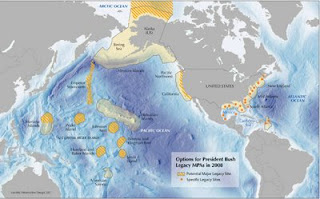


Blog: Saipan Writer (Login to Add to MyJacketFlap)
JacketFlap tags: Writing, Pew Charitable Trust, National Marine Monument, analogies, Add a tag
I like to analyze analogies used for and against proposals. A good analogy can make an argument stronger. A poor analogy loses the day.
There have been some different analogies used about the proposal for a national marine monument:
John Gourley analogized the ocean to a bank, and the national marine monument to a bank policy that let us look at our wealth but not have access to it in times of need. As I mentioned previously, this analogy is oh so wrong because 1) the world is not an unlimited bank from which we can withdraw endlessly; 2) if it is a bank, we are not the "depositors" in the bank and thus don't have the right to withdraw; and 3) even with banks, not having policies that regulate what can be withdrawn will result in bankruptcy.
Besides there is an underlying fallacy in the bank analogy. It presupposes that the national marine monument closes the door to withdrawing needed resources. Here's a map taken from The Saipan Blog.
If the ocean is a bank, then the withdrawal doors look very wide open. Even if ALL of the yellow zones became protected areas, there is still a lot of ocean left to withdraw from.
Another analogy:
In today's letter to the editor , Brad Doerr affirms that the CNMI Legislature was right to go slowly, be cautious, look both ways before crossing the street on the Pew proposal for a National Marine Monument. I think that Mr. Doerr was trying to be conciliatory and diplomatic, trying to get the Legislators to come back to sanity and recast their votes in favor of the National Marine Monument.
But the analogy doesn't work for me. As I view it, we're already standing in the middle of the road. Traffic is whizzing around us, killing our oceans and warming our globe. Pew Charitable Trust is like a kindly safety guard who's rushed out to guide us safely to the side of the road to protect our life. And the CNMI, like a foolish, stupid, immature child, is saying "no, I don't have to move if I don't want to."
Smash, crash. We're all doomed.
Pew Charitable Trust, for their part, have gone off to rescue someone smarter, someone who sees the danger and wants the rescue. Someone who might even say thank you when they're safely on the side of the road.



Bad news...ETS has actually decided to eliminate analogies from the new GRE exam, which will be given as of August, 2011.